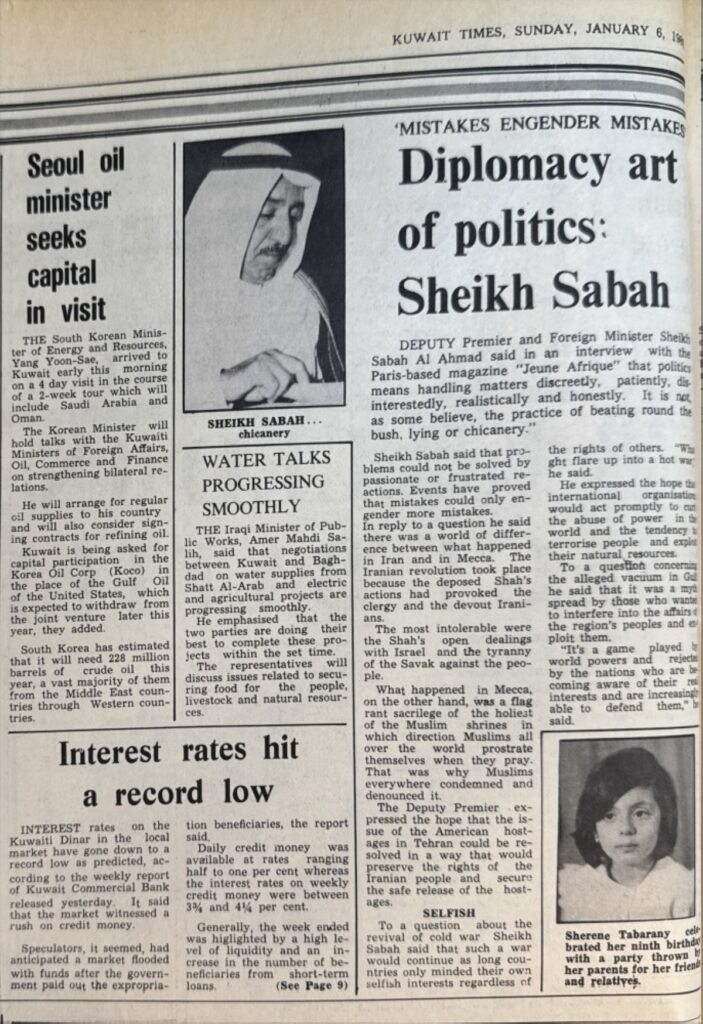The opening stories and headlines of each decade reveal the challenges, hopes and turning points that shaped the region
As each decade begins, the first headlines often set the tone for the months – and sometimes years – ahead. From regional diplomacy and geopolitical tensions to groundbreaking achievements and social issues, Kuwait Times has chronicled the events that defined the early days of each era. This retrospective looks back, decade by decade, at the stories that captured attention and shaped public conversation at the start of each ten-year chapter.
1970: More than half a century after Arab leaders accused Britain of secretly supplying the Zionist entity with tanks, the debate over UK military support remains relevant. A 1970 Al-Ahram report detailed Arab ambassadors’ insistence that London “cannot hide” its arms transfers — an allegation that still echoes in 2025 amid scrutiny over UK-made components in the Zionist entity’s F-35 jets and drone programs. While the UK is not the entity’s main supplier, it has approved hundreds of millions of pounds in export licenses, with components continuing to reach the Zionist military via US production. Then, as now, Britain framed its actions as legal and defensive, while critics argued they fueled aggression.
1980: Kuwait has long championed diplomacy, embedding dialogue and conflict resolution into the fabric of its foreign policy. On January 6, 1980, then Deputy Premier and Foreign Minister Sheikh Sabah Al-Ahmad Al-Jaber Al-Sabah described the “art of politics” as discreet, patient, realistic, and honest – words that would later define his reign as Amir. His call for international organizations to act swiftly against abuse of power and exploitation of natural resources still resonates today, from Gaza to Ukraine. In retrospect, the interview reads as a timeless definition of Kuwait’s diplomatic DNA.

1990: Kuwait Times entered the 1990s with headlines reflecting deep fractures in Zionist politics: “Israel coalition faces collapse” and “‘Mr. No’ trying to stall peace talks.” Prime Minister Yitzhak Shamir, nicknamed “Mr. No,” rejected compromise with Palestinians even as the First Intifada raged and Washington pressed for dialogue. His dismissal of a minister accused of secret PLO contacts underscored his resistance to Palestinian representation. More than three decades later, the pattern endures: Prime Minister Benjamin Netanyahu is delaying ceasefire negotiations and opposing recognition of a Palestinian state, echoing a legacy of obstruction from Shamir to today.

2000: A Kuwait Times report on January 5, 2000 described Iraq as a “lesser threat,” constrained by US and British strikes but still firing at coalition planes and violating no-fly zones. While limited militarily, Iraq remained a justification for continued US presence in the Gulf. Within three years, the narrative shifted dramatically — from “lesser threat” to “imminent danger” — paving the way for the 2003 invasion. The sense of relief at Saddam’s weakness masked a deeper dependency on US forces, while sanctions inflicted heavy human costs, a lesson still relevant in conflicts today.
2010: On January 2–5, 2010, Kuwait Times reported the opening of the world’s tallest skyscraper, Burj Khalifa. At 828 meters, the tower symbolized both engineering achievement and Dubai’s ambitions. But the coverage also reflected the financial strain of the time: a debt crisis, stalled projects, and Abu Dhabi’s crucial bailout, acknowledged by renaming the tower in honor of Sheikh Khalifa. For Kuwait Times, the story embodied Dubai’s vision of becoming a global hub despite economic turbulence.


2020: While 2020 became defined by COVID-19, Kuwait Times began the decade with a labor dispute: the Philippines’ deployment ban on workers to Kuwait after the tragic death of domestic helper Jeanelyn Villavende. On January 5, the paper reported a partial ban on new hires and returnees; by January 16, Manila had expanded it to a full ban after confirming severe abuse. At the time, Kuwait sought alternative recruitment sources to avert shortages. The dispute was only resolved in 2024, when Kuwait lifted restrictions and agreed to a joint technical committee with Manila to safeguard workers’ rights.

